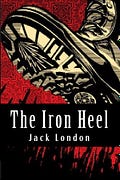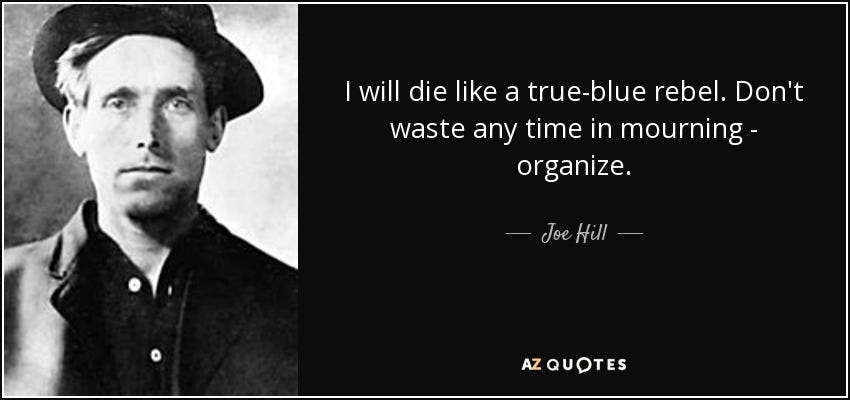[BONUS] Spoiler-Free Review of Jack London's "The Iron Heel"
Lessons learned from a literary classic.
Hey folks! I’m trying something new as a bonus post. I recently read Jack London’s “The Iron Heel” and wanted to share my thoughts on it. If you like this style of review and would like to see more of them for books, movies, shows, etc., let me know by LIKING this post. (You can do so by clicking the ❤️ button up top. I hope you enjoy it! - Joe
One of my greatest pet peeves is when people — especially political commentators and pundits, who should know better — act like unfettered Capitalism was inevitable. I guess it comes down to your personal beliefs in fate, but from where I sit, claiming that American society, which is one part democracy, two parts oligarchy, and ten parts Capitalism, was always going to become the dominant global force it is today.
To my eye, where humanity is today is not an achievement of fate, but a product of decisions, made by both the masses and powerful individuals. Were events to have occurred differently, modernity would look very different (duh!). Had a Confederate messenger not dropped Lee’s dispatches, the Union might have lost the Battle of Antietam, and then the Civil War. (That’s a crazy story, btw.) Had Eugene Debbs not been imprisoned for his speech against WWI, a Socialist movement might have taken hold in the U.S. Had the Japanese not attacked Pearl Harbor, then…
You get the point.
The list goes on and on. There’s no shortage of forks in the historical road that could have made America, and the world, look very different than it does today. Most of these “forks” came during specific periods of turmoil, where American society was forced to make a choice. One of the more intriguing opportunities for change, and perhaps the one that had the most potential to take America down a different path, came at the turn of the 20th century.
Prior to the New Deal and Cold War politics, there was a serious potential for a Socialist movement in the United States. Workers labored six days a week, often up to eighteen hours a day. Conditions were brutal and wages were just enough to keep the working class alive, meaning their experiences were only slightly more improved than those of chattel slavery. Amidst these depraved conditions, Anarchist, Communist, and Socialist politics took root amongst the disposed working class, striking fear into the hearts of the ruling elite.
“Experience teaches us that there may be a slavery of wages only a little less galling and crushing in its effects than chattel slavery, and that this slavery of wages must go down with the other.” - Frederick Douglass, addressing a multi-racial crowd of laborers, 1883.
It is at this time that Jack London wrote his famous novel, The Iron Heel.
Often called the “first dystopian novel,” The Iron Heel portrays this pivotal early 20th-century period through a “what if” lens. Faced with a burgeoning Socialist movement, the American Capitalist class unified into a Fascist government called “The Oligarchy” or “The Iron Heel.” While other successful revolutions sweep the world, citizens of the United States are oppressed. Their civil rights are ignored, their labor is exploited, and their entire existence is reduced to that of a machine — their only worth is in their work.
Just a few pages in, it is clear the resounding effect London’s work has had on modern writers. The Iron Heel is written in the “found manuscript” format, which is annotated by a narrator from a futuristic, Communist society. The obvious parallel is Margaret Atwood’s acclaimed “The Handmaid’s Tale”, which echoes this format. In both works, the inclusion of a narrator in the far-off future (2600, in The Iron Heel) underscores the’s book’s message: This is not the way things end.
Yes, Avis Everhard, the protagonist of The Iron Heel, suffers greatly as she details her fight against The Oligarchy. But as we know from the paragraph notes included by Anthony Meredith (the futuristic scholar narrating her found manuscript), Everhard’s cause will eventually overcome Fascism and issue in a period of prosperity. This framing device adds a sense of relief to what would otherwise be a terribly dreadful account while providing a more sentimental push to the reader: Persist, even when everything appears at a loss.
Stylistic similarities aside, it’s eerily unsettling how much of the early-20th century Jack London was able to predict. He speaks of successful Socialist revolutions in Europe (in real life the German Revolution failed and the Russians were successful), a Capitalist-driven European war (WWI), and, as the title suggests, the great lengths the ruling class will go to stop any threat to their power, even when it is the will of the people.
What he fails to predict, however, is that the Capitalist class would wait for the Socialist movement to find success at the national level before attempting to combat it. In the story, the Socialists win a federal election, driving The Oligarchy to seize power. As we know in real life, Socialism never experienced this level of success in the United States, which I attribute to the aggressive anti-Left politics, including but not limited to the Red Scare campaigns, the assassination and imprisonment of union leaders, and the full-on violent suppression of worker strikes.
Here lies a valuable lesson for the Left, one that we have often overlooked. Anti-Leftist politics won’t begin with the rise of a mass movement coalition. It has already begun. Whether its Starbucks union-busting, the Federal Reserve’s decision to ignore the pro-labor parts of its dual mandate, or the infiltration of Leftist-groups by police officers (as happened in Colorado Springs, about 30 miles south of where I live), The Oligarchy has already consolidated.
It’s just waiting for a neck to step on.
We should approach organizing in the way Jack London encourages us to — strongly, unapologetically, and with a good understanding that our adversaries will go to unparalleled lengths to preserve their power. But at the same time, we should do so knowing that we will be building a better world, one we will not see.
What do you think Jack London would think about our current system, which (IMO) shares characteristics with his foreseen Oligarchy? Share your thoughts in the comments below.




